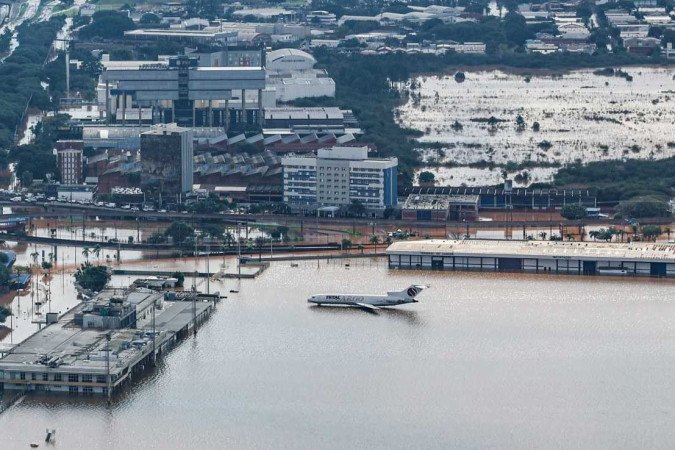Catastrophic Floods Ravage Southern Brazil
With rapidly rising death toll, Southern Brazil grapples with disastrous flooding that's left thousands displaced and missing.
Published May 07, 2024 - 00:05am

Image recovered from correiobraziliense.com.br
Raging floods and landslides set a grim scene in southern Brazil, where over 57 individuals have lost their lives and nearly 70,000 residents have been forced to evacuate their homes, as per the civil defense reports. The floods have also inflicted injuries on at least 74 people, with another 67 unaccounted for amidst the chaos.
Porto Alegre, the bustling city of 1.4 million people, faces an economic threat as it stands in the path of the unrelenting waters. Barrages of floodwater are bearing down on the city, testing the limits of dams and transforming urban landscapes into aquatic wastelands.
Rescue efforts have grown more intense, with dramatic scenes of soldiers airlifting residents and babies from rooftops. The government's response, likened to a 'Marshall Plan', aims for a massive rebuild of the state's infrastructure.
The Guaiba River, meandering through Porto Alegre, has surged to historic highs, turning streets to rivers and swallowing whole communities. The waterways' wrath has paralyzed public transportation and grounded flights, as the Porto Alegre international airport stands indefinitely closed.
Local officials estimate that at least 300 municipalities have sustained storm damage, with long-lasting impacts on freshwater access. Over a million people currently lack potable water, highlighting the disaster's far-reaching effects.
Amidst the chaos, President Luiz Inacio Lula da Silva underscored the climate change factor, supporting the views of climatologists who point to a 'disastrous cocktail' of global warming and El Nino as underlying causes. Previous extreme weather events, like the September cyclone that took at least 31 lives, set a worrying trend for the country frequently battling with the intersection of tropical and polar air masses.
Adding to the woes, the region's critical transport lifelines are disrupted. Major airlines have canceled flights to Porto Alegre until at least the end of the week, leaving the airport underwater and passengers stranded. This logistical nightmare extends beyond the city as neighboring municipalities face isolation due to collapsed bridges and obliterated roads.
The devastation has resonated across the nation, prompting solidarity and collective action. Airline associations, aligning with civil society's efforts, have offered logistical support to ferry donations to those affected by the floods.
The situation in southern Brazil is rapidly evolving into one of the nation's most calamitous natural disasters in recent history, with the floods eliciting a nationwide humanitarian response. Emergency crews from across the country, including firefighters, soldiers, and volunteers, have convened to coordinate search and recovery efforts. Despite the ongoing risk posed by unstable terrain and periodic heavy rainfall, these efforts are ongoing 24/7 to locate those missing and to rescue the trapped and vulnerable.
The infrastructure has suffered devastating blows, with schools, hospitals, and public buildings inundated or cut off due to unprecedented water levels. The cost to rebuild and repair is estimated to be in the billions, with calls for federal aid and international assistance to help bear the financial burden. In parallel to rescue operations, there is an urgent push to restore basic services and to ensure the safety and welfare of those in temporary shelters.
The federal government, under President Lula da Silva, has pledged a significant relief package and is working with state and local governments to assess the full scope of the damage. This collaborative endeavor seeks to not only address the immediate crisis but also to lay down new groundwork to improve resilience against future extreme weather events. Investments in drainage and water management systems, enhanced warning systems, and urban planning that considers escalating climate risks are said to be on the agenda.
Amidst all the damage and distress, there are glimmers of human resilience and solidarity. Stories emerge of communities banding together to provide mutual aid, citizens rescuing neighbors, and businesses offering free services to the displaced. Faith-based organizations and NGOs are setting up soup kitchens and collecting essential items for distribution to those hardest hit by the floods.
The psychological impact of these catastrophic floods is profound. Mental health professionals are being mobilized to provide support to survivors who have lost their homes, livelihoods, and loved ones. The government has earmarked resources for psychological first aid and long-term mental health services as part of the broader rehabilitation efforts.
Environmental experts argue that this disaster underscores the need for sustainable environmental policies. As reconstruction plans are devised, there is a concerted call for development that aligns with ecological stewardship and climate adaptation, such as reforestation initiatives, to prevent soil erosion and maintain natural flood barriers.
As the waters gradually recede, revealing the full extent of the loss, there is a sobering reflection on the future. The flood in Porto Alegre is a stark reminder of the vulnerability of urban centers to the capriciousness of nature, exacerbated by climate change. While the true cost of rebuilding lives and communities remains incalculable, the resolve of a nation to overcome this tragedy and emerge stronger is palpable in the concerted efforts of Brazilians from all walks of life.







